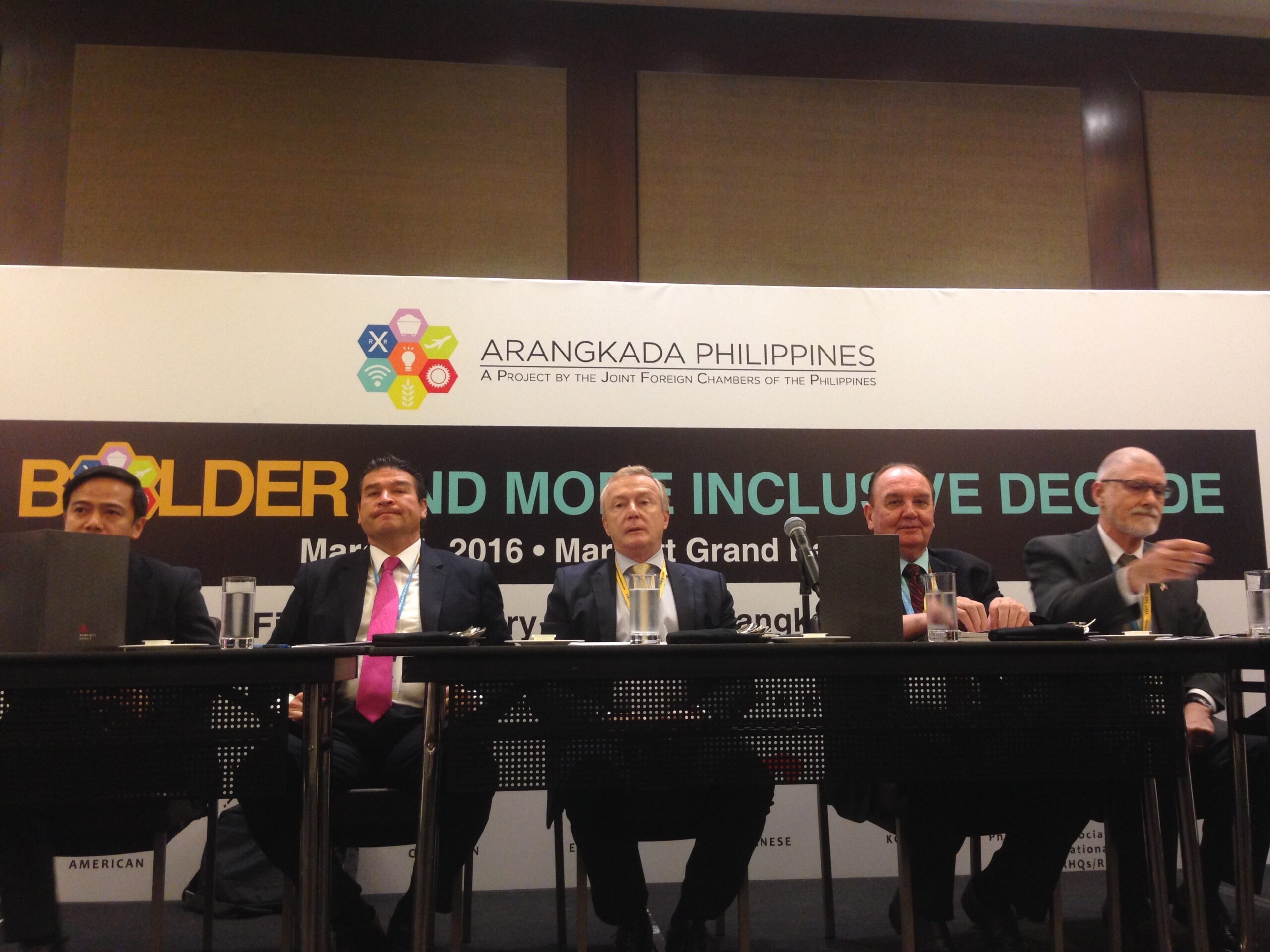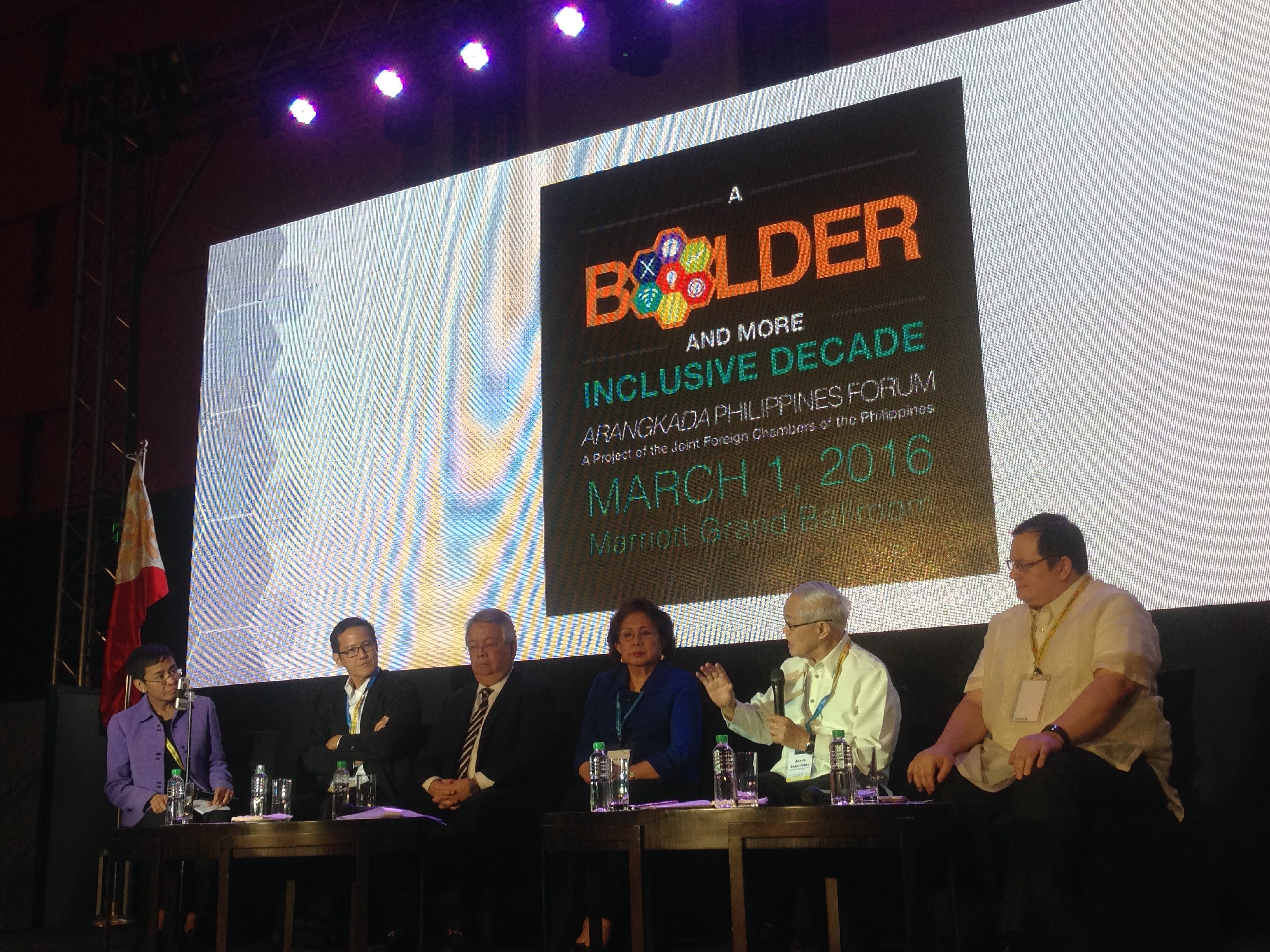SUMMARY
This is AI generated summarization, which may have errors. For context, always refer to the full article.

MANILA, Philippines – The Aquino administration posted improvements in the reforms sought by the largest coalition of foreign investors in the country, but economic growth under its watch has yet to make a dent on unemployment and underemployment.
The Joint Foreign Chambers of the Philippines (JFC), unveiling a progress report at the 5th Arangkada Assessment Forum on Tuesday, March 1, said 74.5% or 333 of 471 its rated recommendations were “active or moving,” inching up from the 74.22% (331) in 2014.
Twenty-five percent or 114 concerns were rated as “dormant.” (READ: Business groups to next president: Grow GDP, FDIs)
The JFC’s “Arangkada” initiative identifies reforms needed for 7 “big winner” sectors: agribusiness; information technology and business process outsourcing (BPO); creative industries; infrastructure; manufacturing and logistics; mining; and tourism, medical travel, and retirement.
Arangkada is Filipino for “accelerate.”
According to JFC, the the National Competitiveness Council is focusing on the weakest areas, but there’s a danger of backsliding under a different leadership.
Top concerns, such as corruption, infrastructure, and education, are being addressed, but “could regress under a different national leadership,” John Forbes, American Chamber of Commerce of the Philippines (AmCham) senior adviser, told reporters in a briefing in Pasay City on Tuesday.
Meanwhile, BPO, infrastructure, manufacturing, and tourism were identified as sectors where progress has been made in policy and economic reforms.
Forbes told a press briefing that measures had been made in legislation, environment, business resiliency, governance, labor, macroeconomic policy, and health, which “enable a more competitive business environment.”
“The fiscal policy of the country is also very good. K to 12 is the major change. There’s a little bit of turnaround in tourism and mining,” Julian Payne, Canadian Chamber of Commerce of the Philippines (CanCham) President, said in a forum.
With the forum theme, “Bolder and More Inclusive Decade,” the JFC highlighted the need for the Philippine government to initiate bolder measures that will transform the Philippine economy in the next decade.
Forbes said these include hiking gross domestic product growth to 9% and increasing annual foreign direct investments to over $10 billion.
But JFC said a number of binding constraints still remain, deterring the country’s track to achieving inclusive growth.
Sectors that need to be strengthened

The JFC said other sectors still need to be “strengthened and reinforced,” such as agribusiness, mining, education, and poverty alleviation.
“There hasn’t been inclusive growth….Basically, there has been a failure of real growth in the agriculture and mining sector which have the greatest potential for employment and development in the rural remote areas,” Payne said.
To address this, the JFC said that the public sector must continue to improve its policies to create more employment opportunities.
“The public sector is the enabler of job growth, while the private sector is the engine. The two must work in parallel for inclusive growth and job creation,” foreign business executives said.
For his part, Education Secretary Armin Luistro said, “The biggest concern is underemployment thus students, under K to 12, must be equipped with adequate skills to not be underemployed.”
“The unemployment record is down in te last quarter 2015 at 5.7%. But too early to celebrate, [this is] still a far cry from ASEAN-6 neighbors,” Luistro added, referring to the 5 other founding members of the Association of Southeast Asian Nations.
Former finance secretary Roberto de Ocampo highlighted the need to push the mining sector forward.
“Mining isn’t a disaster in the Philippine economy. Making a decision is better than dilly dallying, giving mixed signals to investors,” De Ocampo added.
His statement was echoed by CanCham’s Payne, who said, “Banning new mining permits means foregoing employments, additional state revenue possibilities, and economic development in rural remote areas where most of the mines are.”
JFC said these issues must be recognized by the incoming administration after 2016 national and local elections on May 9.
“To increase inclusive growth, you have to address rural unemployment,” Payne said, adding that developments in the agriculture, mining, and tourism sectors would be able to generate more jobs in the country. – Rappler.com
Add a comment
How does this make you feel?
There are no comments yet. Add your comment to start the conversation.